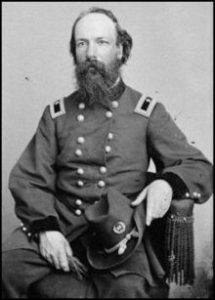 John Wallace Fuller (July 28, 1827 – March 12, 1891) was a British-born American publisher, businessman, and soldier. He served as a general in the Union Army during the American Civil War. After the war, Fuller engaged in the wholesale footwear trade as well as in civil affairs in Ohio.
John Wallace Fuller (July 28, 1827 – March 12, 1891) was a British-born American publisher, businessman, and soldier. He served as a general in the Union Army during the American Civil War. After the war, Fuller engaged in the wholesale footwear trade as well as in civil affairs in Ohio.Civil War Service
When the American Civil War began in 1861, Fuller chose to follow his home state and the Union cause. He was ordered to train soldiers in Grafton, Virginia, which is in modern-day Taylor County, West Virginia.[2] He also briefly served on the staff of Brig. Gen. Charles W. Hill.[1] On August 18, Fuller was given command of the 27th Ohio Infantry with the rank of colonel.[3] Fuller and the 27th first served in Missouri under Brig. Gens. John Pope and David Hunter.[1] He and his command then participated in Pope’s efforts at New Madrid on March 14, and then the Battle of Island Number Ten from February 28 to April 8, 1862.[2]
In the fall of 1862, Fuller was given brigade command in the Army of the Mississippi.[3] He led it in Mississippi during the Battle of Iuka on September 19, and the Second Battle of Corinth on October 3–4.[2] On December 31, his command fought at Battle of Parker’s Cross Roads in Tennessee. During the battle, Fuller’s brigade approached undetected and got behind Confederate Brig. Gen. Nathan Bedford Forrest’s position. Left with no choice but to attack the Federal forces in his front and rear, Forrest had his men charge and repel Fuller’s command, and then quickly reverse and move past and through the rest of the Union soldiers. Fuller and the other Federal units managed to capture six pieces of artillery, about 300 prisoners and 350 horses, but Forrest’s scattered men were able to escape and recrossed the Tennessee River four days later.[4]
Fuller spent most 1863 on garrison duty within the Army of the Tennessee, and was promoted to brigadier general on January 5, 1864.[2] In March 1864, Fuller led his command across the Tennessee River and captured the city of Decatur, Alabama.[1] He participated in the Atlanta Campaign that summer, and temporarily lead a division during the Battle of Atlanta on July 22. He again led his brigade during the March to the Sea in late 1864, and in the Carolinas Campaign of 1865.[5] Fuller was brevetted to the rank of major general[6] in the Union Army on March 13, and after the end of the war he resigned that fall.[3]
Fuller was one of the few generals in the Civil War who was not born in the United States.[5]
Content retrieved from: https://en.wikipedia.org/wiki/John_W._Fuller.